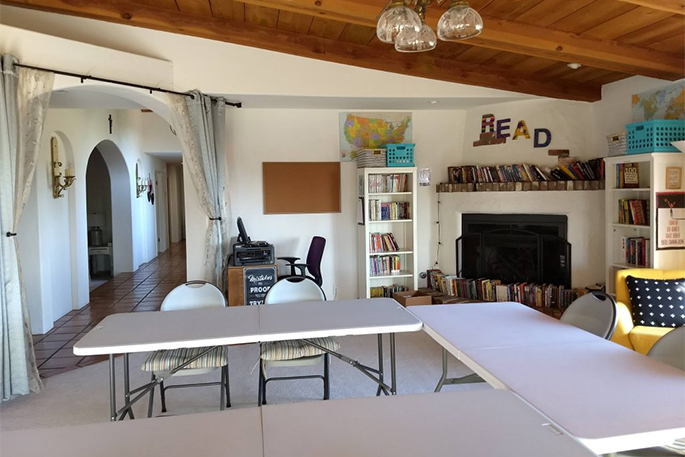
SAN DIEGO, Calif. — Shortly after being licensed by the State of California to care for girls victimized by sex traffickers, Children of the Immaculate Heart faced a crisis: its landlord wanted to sell the San Diego County building that houses its rescue shelter, known as The Refuge.
Losing a home for The Refuge would not just be a headache, but could have spelled the end of the treatment program for girls ages 12 to 17. “As soon as we got our license, he said that he wanted to sell the house and so we had to move out,” said Grace Williams, founder and executive director of Children of the Immaculate Heart (CIH). “Or we can buy it for this really exorbitant price.”
At the time, CIH was preparing to take in its first two residents at The Refuge. (The apostolate also runs St. Bakhita’s Adult Program for older survivors of sex trafficking.) The licensure of The Refuge capped a multi-year roller-coaster ride that included a state bureaucracy openly hostile to the Catholic faith, heroic legal help provided by the Thomas More Society and the Freedom of Conscience Defense Fund, and a Superior Court lawsuit that helped break the logjam. The battle to obtain a license cost Children of the Immaculate Heart $800,000 — before The Refuge ever opened its doors. Coming so soon after CIH was licensed, the real estate issue put the apostolate back in crisis mode.
“When we got the license, we’re kind of married to the facility,” Williams said. “We would not have been able to open (elsewhere), which means going out of business in the end if we hadn’t had that house, because it’s that house the license is attached to, as well as our program.”
Donors stepped up
Williams said the building’s owner was initially seeking substantially more than the house’s appraised value. After a few months of fruitless back-and-forth discussions, a real estate attorney helped broker a deal. “A very, very kind attorney helped us work it out with him and eventually negotiate a price, and then all of a sudden do a quick capital campaign to actually buy the place,” Williams said.
Attorney Paul M. Jonna, who represented CIH during its licensing battle and filed the Superior Court suit against the state, said he realized CIH needed specialized legal help to prevent being forced from its home. “I made sure that CIH had an experienced landlord-tenant attorney to immediately protect CIH’s interests, and the Thomas More Society generously agreed to cover his fees,” said Jonna, a partner with LiMandri & Jonna LLP. “The last thing we wanted was to go through all that work resolving CIH’s constitutional claims with the State of California — only to have the landlord sell the home and force CIH to start the licensing process all over.”
Children of the Immaculate Heart organized a fund drive to raise the $140,000 needed for escrow and a down payment. With those funds quickly in hand, CIH was able to get a three-year loan to complete the purchase.
“The real miracle was when we went into escrow with barely enough for the deposit and not any of the money for the down payment,” Williams said. “… We were not only able to make the down payment but also secure a loan, which is not a joke for a nonprofit. Nobody wants to loan to you and be like, ‘Oh, yeah, we foreclosed the loan for child victims of sex trafficking.’ They just don’t lend to you. We were actually able to get two different loans. Our Lord just provided for everything.”
Purchase of the home secured the long-term future for The Refuge, but it did not end the challenges. In three years, CIH faces a large balloon payment on the loans. With this in mind, the apostolate started its “Keep The Refuge Pledge Drive,” seeking to raise more than $1 million to cover monthly loan payments and eventually pay off the mortgage. More than $216,000 has been raised in less than three months.
“The capital campaign was a really big boost,” Williams said. “One, we worked a lot harder, even having volunteers doing calls to all of our donors about it. That was an exciting thing, for people to see us make such a big step. People really, really stepped up to the plate, which was very nice to see.”
“It was just a giant load off our minds when we had finally signed all of the paperwork,” Williams said. “Also, it was so much work securing that loan, so it was like, ‘Ok we’ve got our time back because we have other things to do.’ It’s really nice to own it and not have an owner who is not so collaborative. It’s nice to not have to deal with that and now do what we want with the house.”

Girls from troubled backgrounds
The Refuge is a six-bed short-term residential therapeutic facility for victims of sex trafficking. The home is named for Our Lady of Charity of the Refuge, a French religious order founded in 1641 by St. John Eudes to care for abandoned women trying to escape lives of prostitution.
Minor victims are recruited or coerced by traffickers into committing commercial sex acts. Most have troubled backgrounds, with a history of being abused or suffering other trauma. It’s a dangerous and toxic life, often lived under the threat or use of violence, or controlled by manipulation, intimidation and the use of addictive drugs. The Refuge provides these girls a safe haven, along with education, treatment for addictions, counseling and life-skills training. Stays last up to six months. The goal is to help the girls heal and set them on a new path in life.
The Refuge opened in September 2020 with two residents. On April 1, 2021, the center increased its staffing enough to have four. Eventually there will be six girls in residence. When The Refuge opened in 2020, California had fewer than two dozen treatment beds for commercially and sexually exploited children. Williams said she already sees the positive impacts the program has on the girls in its care.
“This one who just left, she grew a lot while she was with us,” Williams said. “In her own words she was like, ‘Grace do you think I’ve changed since I came?’ I said, ‘Yes I do!’ She kind of found her voice and is a lot more able to express herself and her needs and speak up or defend herself, which before she really couldn’t do.”
“These kids are all different,” she said. “Some know way too much and some are just so naive. This one particular girl had no clue that it could really, really end up bad for her if you just meet some random guy online and spend the night at his house.”
Many of the referrals are now coming from outside of the San Diego area. This is a good thing, Williams said, since these girls can be lured away by their former traffickers.
“That has worked really well, because the kids with this history are prone to running away,” she said. “So when kids are coming from counties eight hours away, it’s pretty hard to run away. You don’t have anyone to run to. No one’s going to bring drugs to the house for you, or whatever. It has been a pretty good solution for the kids and for us. That’s another thing that has made it much easier.”
Possible plans for expansion
Children of the Immaculate Heart was recently contacted by the Archdiocese of Los Angeles about possibly expanding its operations to the City of Angels. As a model program aimed at an exploding problem, the call was not a surprise. “So the word is out,” Williams said. “We’ll see what happens.”
Sex trafficking is one of the fastest-growing criminal enterprises in America, experts say. San Diego County is one the largest human-trafficking hot spots. A 2016 study by the University of San Diego and Point Loma Nazarene University estimated that between 3,400 and 8,100 people are trafficked each year in the county. Study authors said the illicit sex trade in San Diego is worth $810 million a year. Many trafficking victims are under 18; some are as young as 11 or 12. Girls in foster care are especially vulnerable. Most trafficked girls have a history of childhood trauma such as sexual assault, domestic violence and exposure to alcohol and drugs. Most sex trafficking in San Diego is gang-related.
Williams said she is impressed by the level of CIH’s financial support coming from outside California. The apostolate was contacted by the Western Association of the Order of Malta, part of an international religious order known for its humanitarian relief efforts. “They’ve kind of adopted us both as something they want to volunteer with and also as something they want to financially back,” Williams said.
Jonna noted the “great success” The Refuge has had to date helping victims of sex trafficking. “Survivors of sex trafficking need help now more than ever, and CIH has the leadership, experience, and dedication — not to mention faith and love — necessary to save these vulnerable and victimized women,” Jonna said.

If you value the news and views Catholic World Report provides, please consider donating to support our efforts. Your contribution will help us continue to make CWR available to all readers worldwide for free, without a subscription. Thank you for your generosity!
Click here for more information on donating to CWR. Click here to sign up for our newsletter.







Leave a Reply